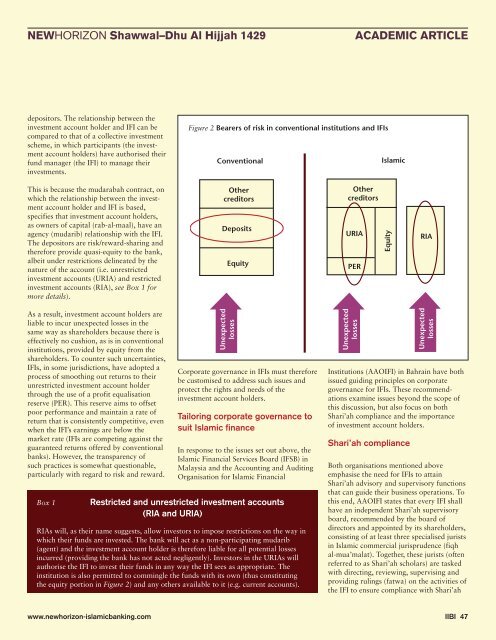azerbaijan: emerging market islamic banking and finance
azerbaijan: emerging market islamic banking and finance
azerbaijan: emerging market islamic banking and finance
Create successful ePaper yourself
Turn your PDF publications into a flip-book with our unique Google optimized e-Paper software.
NEWHORIZON Shawwal–Dhu Al Hijjah 1429<br />
ACADEMIC ARTICLE<br />
depositors. The relationship between the<br />
investment account holder <strong>and</strong> IFI can be<br />
compared to that of a collective investment<br />
scheme, in which participants (the investment<br />
account holders) have authorised their<br />
fund manager (the IFI) to manage their<br />
investments.<br />
Figure 2 Bearers of risk in conventional institutions <strong>and</strong> IFIs<br />
This is because the mudarabah contract, on<br />
which the relationship between the investment<br />
account holder <strong>and</strong> IFI is based,<br />
specifies that investment account holders,<br />
as owners of capital (rab-al-maal), have an<br />
agency (mudarib) relationship with the IFI.<br />
The depositors are risk/reward-sharing <strong>and</strong><br />
therefore provide quasi-equity to the bank,<br />
albeit under restrictions delineated by the<br />
nature of the account (i.e. unrestricted<br />
investment accounts (URIA) <strong>and</strong> restricted<br />
investment accounts (RIA), see Box 1 for<br />
more details).<br />
As a result, investment account holders are<br />
liable to incur unexpected losses in the<br />
same way as shareholders because there is<br />
effectively no cushion, as is in conventional<br />
institutions, provided by equity from the<br />
shareholders. To counter such uncertainties,<br />
IFIs, in some jurisdictions, have adopted a<br />
process of smoothing out returns to their<br />
unrestricted investment account holder<br />
through the use of a profit equalisation<br />
reserve (PER). This reserve aims to offset<br />
poor performance <strong>and</strong> maintain a rate of<br />
return that is consistently competitive, even<br />
when the IFI’s earnings are below the<br />
<strong>market</strong> rate (IFIs are competing against the<br />
guaranteed returns offered by conventional<br />
banks). However, the transparency of<br />
such practices is somewhat questionable,<br />
particularly with regard to risk <strong>and</strong> reward.<br />
Box 1<br />
Corporate governance in IFIs must therefore<br />
be customised to address such issues <strong>and</strong><br />
protect the rights <strong>and</strong> needs of the<br />
investment account holders.<br />
Tailoring corporate governance to<br />
suit Islamic <strong>finance</strong><br />
In response to the issues set out above, the<br />
Islamic Financial Services Board (IFSB) in<br />
Malaysia <strong>and</strong> the Accounting <strong>and</strong> Auditing<br />
Organisation for Islamic Financial<br />
Restricted <strong>and</strong> unrestricted investment accounts<br />
(RIA <strong>and</strong> URIA)<br />
RIAs will, as their name suggests, allow investors to impose restrictions on the way in<br />
which their funds are invested. The bank will act as a non-participating mudarib<br />
(agent) <strong>and</strong> the investment account holder is therefore liable for all potential losses<br />
incurred (providing the bank has not acted negligently). Investors in the URIAs will<br />
authorise the IFI to invest their funds in any way the IFI sees as appropriate. The<br />
institution is also permitted to commingle the funds with its own (thus constituting<br />
the equity portion in Figure 2) <strong>and</strong> any others available to it (e.g. current accounts).<br />
Institutions (AAOIFI) in Bahrain have both<br />
issued guiding principles on corporate<br />
governance for IFIs. These recommendations<br />
examine issues beyond the scope of<br />
this discussion, but also focus on both<br />
Shari’ah compliance <strong>and</strong> the importance<br />
of investment account holders.<br />
Shari’ah compliance<br />
Both organisations mentioned above<br />
emphasise the need for IFIs to attain<br />
Shari’ah advisory <strong>and</strong> supervisory functions<br />
that can guide their business operations. To<br />
this end, AAOIFI states that every IFI shall<br />
have an independent Shari’ah supervisory<br />
board, recommended by the board of<br />
directors <strong>and</strong> appointed by its shareholders,<br />
consisting of at least three specialised jurists<br />
in Islamic commercial jurisprudence (fiqh<br />
al-mua’malat). Together, these jurists (often<br />
referred to as Shari’ah scholars) are tasked<br />
with directing, reviewing, supervising <strong>and</strong><br />
providing rulings (fatwa) on the activities of<br />
the IFI to ensure compliance with Shari’ah<br />
www.newhorizon-<strong>islamic</strong><strong>banking</strong>.com IIBI 47
















